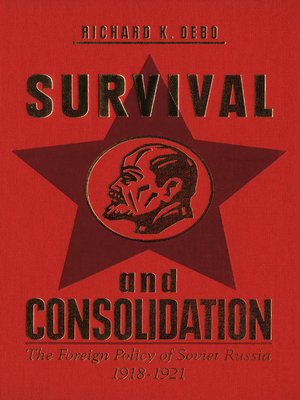Survival and Consolidation
ebook ∣ The Foreign Policy of Soviet Russia, 1918-1921
By Richard K. Debo

Sign up to save your library
With an OverDrive account, you can save your favorite libraries for at-a-glance information about availability. Find out more about OverDrive accounts.
Find this title in Libby, the library reading app by OverDrive.



Search for a digital library with this title
Title found at these libraries:
| Library Name | Distance |
|---|---|
| Loading... |
With victory in sight, the Bolsheviks turned their attention to the consolidation of power within the former Russian empire. When they took power in 1917, the Bolsheviks believed their revolution had to spread beyond Russia or perish. Neither happened, and in the spring of 1921, at the end of hostilities, they stood alone in the wreckage of the former Tsarist empire. The Bolsheviks had, in Lenin's words, "won the right to an independent existence." This entirely unforseen situation surprised both them and their enemies. Debo shows, however, that nothing predetermined that Soviet Russia would, at the end of the civil war, enjoy an "independent existence" — or even exist at all. He suggests that a wide range of circumstances contributed to the eventual outcome of the war and that it could have ended indecisively. In his evaluation of the Soviet diplomatic achievement, Debo describes their successes with Britain, Poland, and Germany, their continuing difficulties with Romania, France, and the United States, and the threat from the Far East. This diplomatic success, he maintains, was the result of Soviet victory in the civil war and the patient pursuit of realizable objectives.







